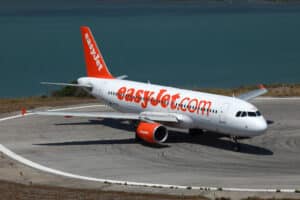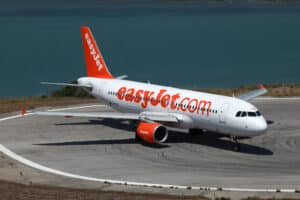
The boss of easyJet hailed a “strong and sustained” recovery in trading since the relaxation of travel restrictions as the budget airline beat first-half forecasts.
Johan Lundgren, the chief executive, said the recovery presaged “a positive outlook for Easter and beyond” with daily booking volumes tracking ahead of pre-pandemic levels.
EasyJet, the dominant airline at Gatwick, the second largest airport in Britain, said that more bookings had been made during the past six weeks than in the equivalent period in 2019 as customers booked closer to departure, and it expected to operate at close to pre-pandemic flight levels for the summer as a whole.
In a trading statement for the six months to the end of March, the airline said its losses had reduced compared with last year, outperforming expectations. This was despite the challenges of Covid, rising fuel prices and costs from ramping up operations. Much of the outperformance was due to “self-help” measures.
The airline said that it had boosted capacity throughout the second quarter, operating at 80 per cent of 2019 levels last month and at 67 per cent for the three-month period. It carried 11.5 million passengers for the quarter, up from 1.2 million in the second quarter of last year.
Since the British government lifted travel restrictions in January, the airline said it had seen “a strong and sustained recovery in trading”. It predicted revenues of £1.5 billion in the first half of its financial year, with seasonal pre-tax losses of between £535 million and £565 million, compared with analyst forecasts for a loss of £618 million.
The war in Ukraine has had little impact on the carrier: it benefited from having very little exposure in eastern Europe, with no routes to Ukraine, Russia or Belarus. Its nearest network points are Budapest in Hungary and Krakow in Poland, which only account for 1.4 per cent of its total capacity. None of its flight routes need to operate in Ukrainian, Belarusian or Russian airspace so it does not have to reroute its aircraft, which would mean increased fuel consumption.
Business BriefingIn-depth analysis and comment on the latest financial and economic news.One-click sign up.
EasyJet said it continued to experience strong demand for the final quarter from July to September, especially on leisure routes. This has been boosted by the addition of a further five aircraft-worth of slots in Greece, making easyJet the largest carrier flying into the main Greek islands this summer.
The company said that its easyJet Holidays division “continues to strengthen its position as a significant player in the holidays market” with more than 70 per cent of the programme already sold at “significantly stronger” margins compared with 2019.
It has not all been smooth flying, however. The short-haul European airline, the second-largest behind Ryanair with more than 300 aircraft in its fleet, said it was cancelling hundreds of flights due to high levels of staff shortages because of Covid. It said cancellations were being made in advance “to give customers the ability to rebook on to alternative flights”.
Lundgren, 55, insisted it was “absolutely not” fair to accuse the airline of selling flights it could not fulfil. He said that crew absence levels were double the normal rate. “We were having in some cases up to 20 per cent of absence, and you wouldn’t expect any airline at any point in time to be able to cover that,” he said.
He said the number of flight cancellations represented a relatively small proportion of its total operations, adding that 94 per cent of its planned schedule had run in the past seven days. He called on the Department for Transport to speed up its security vetting of new employees to enable the airline to fill some of the shortfall.
EasyJet said it had entered into a sale and leaseback deal for ten Airbus A319s, generating total cash proceeds of $120 million and a loss of about £20 million during the first half.
Read more:
EasyJet heads for the heights after two years of turbulence
